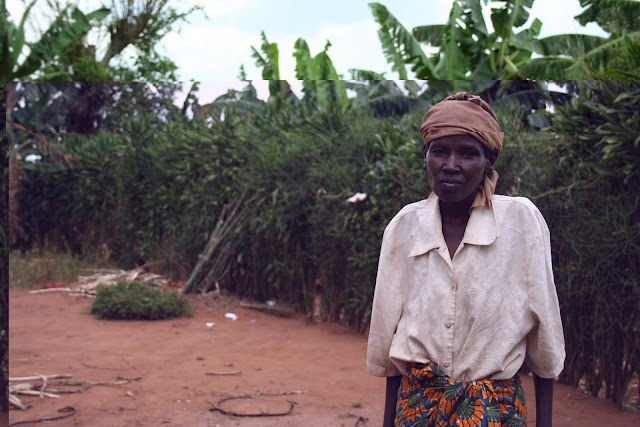Well, it’s the end of my first full week in Rwamagana. It
was sad to say goodbye to the rest of the GoEd crew. Ali and Kelli who were
going to Kionza, and the others left in Kigali. I really enjoyed singing them a
goodbye song before we left, and hugging everyone goodbye before we squished
tightly into the matatu.
My practicum has been pretty good so far. Seven others from
the GoEd team and I are staying at a guesthouse at the Avega compound—it’s a
nice place, we all have our own rooms with our own bathrooms. The room service
is pretty nice too. They take our dirty clothes and wash them and dry them, so
by the time we return to our rooms at the end of the day our laundry is
finished.
I’ve been working at the Center for Champions, a home/school
for orphans and street children from Kigali. Most of the children are orphans
that have been given a better life and opportunity here than they would in the
streets. My official title in the practicum is “Communications Coordinator”, in
charge of social media updates, marketing sponsorships, and making videos,
updating pictures, et cetera. It’s been pretty good.
The first day we arrived was very busy, and overwhelming. The
people who are at the Center for Champions practicums met with Melissa, one of
the staff, when we got here. We toured the campus and spoke about the code of
conduct, as well as what each of us would be doing. After the tour, we met a
few of the boys that are here—friendly and funny fellows. This week has been a
process of learning their names and getting to know them.
 |
| Patrick on the left, others playing ball in the background. |
Melissa took us to the market for the first time so we could
buy some water. We bought a few boxes and took bicycle taxis back to the
compound. That was a unique experience, quite exciting! Carrying a huge box of
water bottles on my leg as we breezed through the Rwandan countryside on dirt
roads hemmed by banana patches and corn. I loved it.
This week our first major task was to put on a dental
hygiene workshop for the catch-up students. The catch-up students are the ones
that missed out on primary school earlier in life and are now taking six years
of it in three years at the Center. Anyway, we were tasked with presenting good
dental hygiene. I didn’t expect it to be so fun. We acted out a skit about what
happens when you don’t brush your teeth. Afterward we gave the students their
own toothbrushes and toothpaste and gave them an opportunity to practice what
we taught them by brushing their teeth in class. I got some good video from
that, and pictures too.
 |
| Mikaela wields the giant toothbrush we used in our skits. It was a lot of fun. |
My first project will be to make a video that can be sent to
Crest and Colgate and other dental hygiene companies for some sort of
sponsorship. The goal is to get free materials by demonstrating the Center’s
intention for excellent hygiene. Pretty cool. I worked on the footage all
afternoon. Tomorrow and next week I’ll get some interviews to splice in and out
and make a nice little short to send off. I’ve also been working on logos for
the Center, and taking plenty of pictures to begin updating the Facebook page
next week.
Overall, the work has been good, and I’m really glad I’m
with the group I’m with. It’s been really nice to crash in my own room at the
end of the night, as well as just hang out with the other seven people here.
There is a really nice one-stop shop up the road where they
sell these fried things. They make my tummy feel really weird, but they are so
good—they have meat and a hard-boiled egg inside a fried wrapper in the shape
of a triangle. Ryan and I have been frequenting the one-stop shop for them.
They are 50 cents, and amazing.
There is a lot of physical activity here. Yesterday we
played basketball for about two hours. After dinner we came back to the center
for hip hop dance night. It was hilarious, and beautiful. It’s pretty much all
guys at the Center, so walking into a room full of guys breakdancing, hip-hop
dancing, and just having an awesome time listening to bangin’ tunes was so
cool. I loved it. I got to dance again with Africans—this time my new friends. There
are all kinds of age groups, and it was awesome to get down with little Idi and
Claude, and also to break with Alexis.
Thanks for reading. I could share a lot of other stuff, but I’ll
save those stories for when I get home. This experience has been positive thus
far, but I want to make sure that it remains a productive time. It’s tempting
to just play with the children, but I have to remember that I’m here to promote
the Center in different ways, and not just benefit myself and the children by
hanging out with them and playing with them. Yes, that’s so important. But I am
convinced that my role here is more than just immediate love for these kids—I think
that what I do for the center long term through marketing, advertising, media,
or whatever else is what I’m ultimately here for.
One last thing—the kids love it when I beatbox. They think
it’s the coolest thing in the world. Leonard was rapping yesterday when I was
beatboxing after the basketball game.
 |
| This is Leonard. He's good at volleyball and rapping. |



